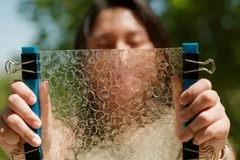Philippine barako coffee is now in capsules

For the first time, Philippine barako coffee is now available in capsules, similar to those little plastic milk or cream containers with a foil cover. Just pop one into a specially designed coffee-maker and you can be your own barista even in your tiny condo.
For the first time, Philippine barako coffee is now available in capsules, similar to those little plastic milk or cream containers with a foil cover. Just pop one into a specially designed coffee-maker and you can be your own barista even in your tiny condo.
The barako coffee capsules were launched in Makati on Wednesday along with the K-fee cube coffee-maker, which uses the new convenient packaging instead of the messy ground beans and strainers to produce the perfect cuppa.rom Philippine Coffee Board Inc.
The mother company of the Vienna-based K System GMBH, which makes the K-fee cube coffee-maker, is the coffee specialty firm Krüger in Cologne, Germany.
“Filipinos have always sent roasted barako coffee beans abroad. They easily lose their flavor. Ground coffee can lose their freshness and flavor in days," observes Juan.
“With barako coffee capsules, the freshness and flavor can be maintained for at least a year," she adds.
“At present, the coffee capsule is the easiest and most convenient way to enjoy high-quality coffee, specifically espressos," explains Roland Herrmann, an officer of K System GMBH in charge of the Asian region.
Indeed, the coffee capsule retains the original taste of freshly roasted barako ground coffee. Although many months have passed since the beans were sent to Germany, the aroma and bitterness of barako were retained in the capsules sampled at the tasting event.
“A coffee capsule gives a coffee-lover the same taste and the same high-quality coffee sold at expensive coffee shops at affordable prices," Herrmann says.
“The process of making barako capsules from roasted coffee beans took less than eight days. Due to the highly stringent measures that we took in packaging the barako capsules, they can stay fresh for at least one year," he assures coffee lovers.
Asia is shifting to coffee
Coffee capsules have long been a staple in the international specialty brew market, but it is only now that Philippine coffee has joined the bandwagon. Herrmann says they have launched coffee capsules, using coffee beans from various countries, and their K-fee cube machines in Europe and Asia.
“There is a fast-growing coffee industry and business in Asia, where the demand for high quality coffee is escalating," he says. “Japan, China, and Korea are noticeably shifting from tea-drinking to coffee-drinking," adds Herrmann.
“We’ve had good discussions for distribution. I think we have a pretty big chance to become No. 1 in the Asian market in the coffee capsule market in five to 10 years," he says.
The K-fee cube machine is estimated to be sold in the local market at less than P7,000, he says. It takes up little space - with a height of 22 cm, width of 32 cm, and length of 24 cm, says Wolfgang Fojtl, a colleague of Hermann.
Each machine can accommodate a “quick change-over" from a small espresso cup to a large latte glass. “For busy people, the good news is that each detachable part of a K-fee cube is dishwasher-safe," says Nelson Cui from the China office of K System.
So if you’ve ever dreamt of becoming a barista someday but never had the time to take lessons, take heart. If you’ve got the money to spare, you can buy a coffee machine and get your caffeine fix right in the comfort of your own home.












